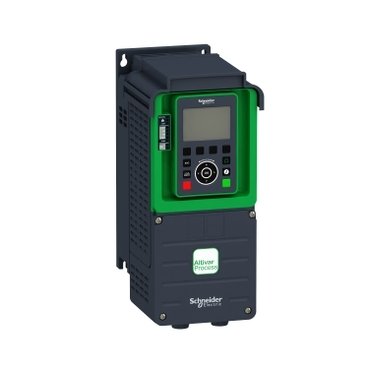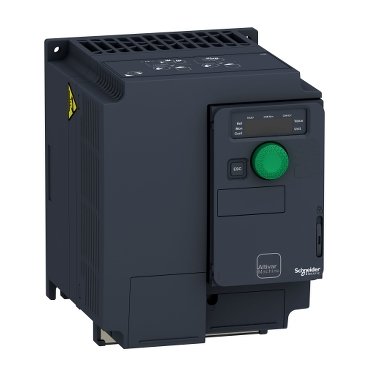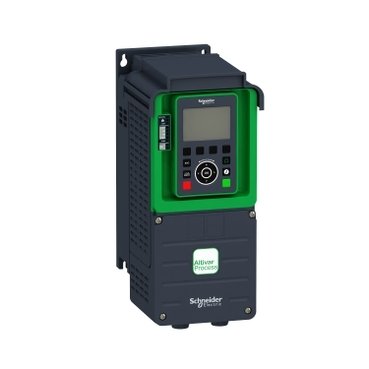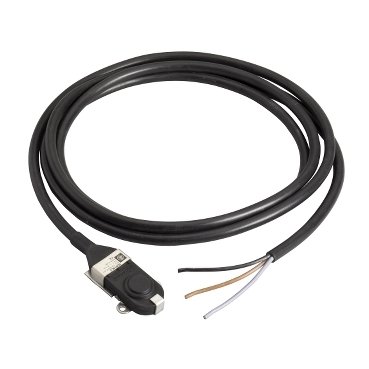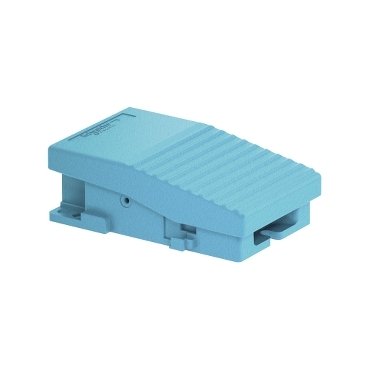ATV930U55N4 variable speed drive, Altivar Process ATV900
Original price was: $1,417.00.$1,090.00Current price is: $1,090.00.
The ATV930U55N4 is a variable speed drive from Schneider Electric’s Altivar Process ATV900 series, rated for 5.5 kW and operating at 380-480V.
3 in stock
Free shipping on orders over $5000!
- Satisfaction Guaranteed
- No Hassle Refunds
- Secure Payments
Description
| range of product | Altivar Process ATV900. |
|---|---|
| device application | Industrial application. |
| product or component type | Variable speed drive. |
| product destination | Asynchronous motors. Synchronous motors. |
| product specific application | Process for industrial. |
| variant | Standard version. With braking chopper. |
| network number of phases | 3 phases. |
| mounting mode | Wall mount. |
| communication port protocol | EtherNet/IP. Modbus TCP. Modbus serial. |
| [Us] rated supply voltage | 380…480 V – 15…10 %. |
| motor power kW | 5.5 kW for normal duty. 4.0 kW for heavy duty. |
| motor power hp | 7.5 hp for normal duty. 5.0 hp for heavy duty. |
| continuous output current | 12.7 A at 4 kHz for normal duty. 9.3 A at 4 kHz for heavy duty. |
| EMC filter | Integrated With EMC plate option. |
| IP degree of protection | IP21. |
| degree of protection | UL type 1. |
| option module | Slot A: communication module for Profibus DP V1. Slot A: communication module for PROFINET. Slot A: communication module for DeviceNet. Slot A: communication module for EtherCAT. Slot A: communication module for CANopen daisy chain RJ45. Slot A: communication module for CANopen SUB-D 9. Slot A: communication module for CANopen screw terminals. Slot A/slot B/slot C: digital and analog I/O extension module. Slot A/slot B/slot C: output relay extension module. Slot B: 5/12 V digital encoder interface module. Slot B: analog encoder interface module. Slot B: resolver encoder interface module. communication module for Ethernet Powerlink. |
| discrete input logic | 16 preset speeds. |
| asynchronous motor control profile | Optimized torque mode. Variable torque standard. Constant torque standard. |
| synchronous motor control profile | Permanent magnet motor. Synchronous reluctance motor. |
| maximum output frequency | 599 Hz. |
| switching frequency | 2…16 kHz adjustable. 4…16 kHz with derating factor. |
| nominal switching frequency | 4 kHz |
| line current | 10.4 A at 380 V (normal duty). 8.0 A at 380 V (heavy duty). 9.1 A at 480 V (normal duty). 7.2 A at 480 V (heavy duty). |
| apparent power | 7.6 kVA at 480 V (normal duty). 6 kVA at 480 V (heavy duty). |
| maximum transient current | 15.2 A during 60 s (normal duty). 14 A during 60 s (heavy duty). |
| network frequency | 50…60 Hz. |
| prospective line Isc | 50 kA |
| discrete input number | 10 |
|---|---|
| discrete input type | DI1…DI8 programmable, 24 V DC (<= 30 V), impedance: 3.5 kOhm. DI7, DI8 programmable as pulse input: 0…30 kHz, 24 V DC (<= 30 V). STOA, STOB safe torque off, 24 V DC (<= 30 V), impedance: > 2.2 kOhm. |
| discrete output number | 2. |
| discrete output type | Logic output DQ+ 0…1 kHz <= 30 V DC 100 mA. Programmable as pulse output DQ+ 0…30 kHz <= 30 V DC 20 mA. Logic output DQ- 0…1 kHz <= 30 V DC 100 mA. |
| analogue input number | 3 |
| analogue input type | AI1, AI2, AI3 software-configurable voltage: 0…10 V. DC, impedance: 30 kOhm, resolution 12 bits. AI1, AI2, AI3 software-configurable current: 0…20. mA/4…20 mA, impedance: 250 Ohm, resolution 12. bits. |
| analogue output number | 2 |
| analogue output type | Software-configurable voltage AQ1, AQ2: 0…10 V DC impedance 470 Ohm, resolution 10 bits. Software-configurable current AQ1, AQ2: 0…20 mA impedance 500 Ohm, resolution 10 bits. |
| relay output number | 3 |
| relay output type | Configurable relay logic R1: fault relay NO/NC electrical durability 100000 cycles. Configurable relay logic R2: sequence relay NO electrical durability 1000000 cycles. Configurable relay logic R3: sequence relay NO electrical durability 1000000 cycles. |
| maximum switching current | Relay output R1 on resistive load, cos phi = 1: 3 A at 250 V AC. Relay output R1 on resistive load, cos phi = 1: 3 A at 30 V DC. Relay output R1 on inductive load, cos phi = 0.4 and L/R = 7 ms: 2 A at 250 V AC. Relay output R1 on inductive load, cos phi = 0.4 and L/R = 7 ms: 2 A at 30 V DC. Relay output R2, R3 on resistive load, cos phi = 1: 5 A at 250 V AC. Relay output R2, R3 on resistive load, cos phi = 1: 5 A at 30 V DC. Relay output R2, R3 on inductive load, cos phi = 0.4 and L/R = 7 ms: 2 A at 250 V AC. Relay output R2, R3 on inductive load, cos phi = 0.4 and L/R = 7 ms: 2 A at 30 V DC. |
| minimum switching current | Relay output R1, R2, R3: 5 mA at 24 V DC. |
| physical interface | Ethernet. 2-wire RS 485. |
| connector type | 2 RJ45. 1 RJ45. |
| method of access | Slave Modbus TCP. |
| transmission rate | 10, 100 Mbits. 4.8 kbps. 9600 bit/s. 19200 bit/s. |
| transmission frame | RTU |
| number of addresses | 1…247 |
| data format | 8 bits, configurable odd, even or no parity. |
| type of polarization | No impedance. |
| 4 quadrant operation possible | True |
| acceleration and deceleration ramps | Linear adjustable separately from 0.01…9999 s.. |
| motor slip compensation | Adjustable. Can be suppressed. Not available in permanent magnet motor law. Automatic whatever the load. |
| braking to standstill | By DC injection. |
| brake chopper integrated | True |
| maximum input current | 10.4 A |
| maximum output voltage | 480.0 V |
| relative symmetric network frequency tolerance | 5 % |
| base load current at high overload | 9.3 A |
| base load current at low overload | 12.7 A |
| power dissipation in W | Natural convection: 36 W at 380 V, switching frequency 4 kHz. Forced convection: 145 W at 380 V, switching frequency 4 kHz. |
| with safety function Safely Limited Speed (SLS) | True |
| with safety function Safe brake management (SBC/SBT) | True |
| with safety function Safe Operating Stop (SOS) | False |
| with safety function Safe Position (SP) | False |
| with safety function Safe programmable logic | False |
| with safety function Safe Speed Monitor (SSM) | False |
| with safety function Safe Stop 1 (SS1) | True |
| with sft fct Safe Stop 2 (SS2) | False |
| with safety function Safe torque off (STO) | True |
| with safety function Safely Limited Position (SLP) | False |
| with safety function Safe Direction (SDI) | False |
| protection type | Thermal protection: motor. Safe torque off: motor. Motor phase break: motor. Thermal protection: drive. Safe torque off: drive. Overheating: drive. Overcurrent between output phases and earth: drive. Overload of output voltage: drive. Short-circuit protection: drive. Motor phase break: drive. Overvoltages on the DC bus: drive. Line supply overvoltage: drive. Line supply undervoltage: drive. Line supply phase loss: drive. Overspeed: drive. Break on the control circuit: drive. |
| quantity per set | 1 |
| width | 144 mm |
| height | 350 mm |
| depth | 206 mm |
| net weight | 4.7 kg |
| electrical connection | Control: screw terminal 0.5…1.5 mm²/AWG 20…AWG 16. Line side: screw terminal 2.5…6 mm²/AWG 14…AWG 10. DC bus: screw terminal 2.5…6 mm²/AWG 14…AWG 10. Motor: screw terminal 4…6 mm²/AWG 12…AWG 10. |
| transmission rate | 10/100 Mbit/s for Ethernet IP/Modbus TCP. 4.8, 9.6, 19.2, 38.4 kbit/s for Modbus serial. |
| exchange mode | Half duplex, full duplex, autonegotiation Ethernet IP/Modbus TCP. |
| data format | 8 bits, configurable odd, even or no parity for Modbus serial. |
| type of polarization | No impedance for Modbus serial. |
| number of addresses | 1…247 for Modbus serial. |
| supply | External supply for digital inputs: 24 V DC (19…30 V), <1.25 mA, protection type: overload and short-circuit protection. Internal supply for reference potentiometer (1 to 10 kOhm): 10.5 V DC +/- 5 %, <10 mA, protection type: overload and short-circuit protection. Internal supply for digital inputs and STO: 24 V DC (21…27 V), <200 mA, protection type: overload and short-circuit protection. |
| local signalling | Local diagnostic: 3 LED (mono/dual colour). Embedded communication status: 5 LED (dual colour). Communication module status: 2 LED (dual colour). Presence of voltage: 1 LED (red). |
| input compatibility | DI1…DI8: discrete input level 1 PLC conforming to EN/IEC 61131-2. DI7, DI8: pulse input level 1 PLC conforming to IEC 65A-68. STOA, STOB: discrete input level 1 PLC conforming to EN/IEC 61131-2. |
| discrete input logic | Positive logic (source) (DI1…DI8), < 5 V (state 0), > 11 V (state 1). Negative logic (sink) (DI1…DI8), > 16 V (state 0), < 10 V (state 1). Positive logic (source) (DI7, DI8), < 0.6 V (state 0), > 2.5 V (state 1). Positive logic (source) (STOA, STOB), < 5 V (state 0), > 11 V (state 1). |
| sampling duration | 2 ms +/- 0.5 ms (DI1…DI8) – discrete input. 5 ms +/- 1 ms (DI7, DI8) – pulse input. 1 ms +/- 1 ms (AI1, AI2, AI3) – analog input. 5 ms +/- 1 ms (AQ1, AQ2) – analog output. |
| accuracy | +/- 0.6 % AI1, AI2, AI3 for a temperature variation 60 °C analog input. +/- 1 % AQ1, AQ2 for a temperature variation 60 °C analog output. |
| linearity error | AI1, AI2, AI3: +/- 0.15 % of maximum value for analog input. AQ1, AQ2: +/- 0.2 % for analog output. |
| refresh time | Relay output (R1, R2, R3): 5 ms (+/- 0.5 ms). |
| isolation | Between power and control terminals. |
| operating altitude | <= 1000 m without derating. 1000…4800 m with current derating 1 % per. 100 m |
|---|---|
| operating position | Vertical +/- 10 degree. |
| product certifications | TÜV CSA UL |
| marking | CE |
| standards | UL 508C EN/IEC 61800-3. EN/IEC 61800-5-1. IEC 61000-3-12. IEC 60721-3. IEC 61508. IEC 13849-1. |
| maximum THDI | <48 % full load conforming to IEC 61000-3-12 |
| assembly style | Enclosed. |
| electromagnetic compatibility | Electrostatic discharge immunity test level 3 conforming to IEC 61000-4-2. Radiated radio-frequency electromagnetic field immunity test level 3 conforming to IEC 61000-4-3. Electrical fast transient/burst immunity test. level 4 conforming to IEC 61000-4-4. 1.2/50 µs – 8/20 µs surge immunity test level 3 conforming to IEC 61000-4-5. Conducted radio-frequency immunity test level 3 conforming to IEC 61000-4-6. |
| environmental class (during operation) | Class 3C3 according to IEC 60721-3-3. Class 3S3 according to IEC 60721-3-3. |
| maximum acceleration under shock impact (during operation) | 150 m/s² at 11 ms. |
| maximum acceleration under vibrational stress (during operation) | 10 m/s² at 13…200 Hz. |
| maximum deflection under vibratory load (during operation) | 1.5 mm at 2…13 Hz. |
| permitted relative humidity (during operation) | Class 3K5 according to EN 60721-3. |
| volume of cooling air | 38 m3/h |
| overvoltage category | III |
| regulation loop | Adjustable PID regulator. |
| insulation resistance | > 1 MOhm 500 V DC for 1 minute to earth. |
| noise level | 54.5 dB conforming to 86/188/EEC. |
| vibration resistance | 1.5 mm peak to peak (f= 2…13 Hz). conforming to IEC 60068-2-6. 1 gn (f= 13…200 Hz) conforming to IEC. 60068-2-6. |
| shock resistance | 15 gn for 11 ms conforming to IEC 60068-2-27 |
| environmental characteristic | Chemical pollution resistance class 3C3. conforming to EN/IEC 60721-3-3. Dust pollution resistance class 3S3. conforming to EN/IEC 60721-3-3. |
| relative humidity | 5…95 % without condensation conforming to IEC 60068-2-3. |
| ambient air temperature for operation | -15…50 °C (without derating). 50…60 °C (with derating factor). |
| noise level | 54.5 dB |
| pollution degree | 2 |
| ambient air transport temperature | -40…70 °C |
| ambient air temperature for storage | -40…70 °C |
| Unit Type of Package 1 | PCE |
|---|---|
| Number of Units in Package 1 | 1 |
| Package 1 Weight | 6.288 kg |
| Package 1 Height | 18.5 cm |
| Package 1 width | 41.0 cm |
| Package 1 Length | 31.0 cm |
| Unit Type of Package 2 | P06 |
| Number of Units in Package 2 | 6 |
| Package 2 Weight | 50.728 kg |
| Package 2 Height | 73.5 cm |
| Package 2 width | 80.0 cm |
| Package 2 Length | 60.0 cm |

